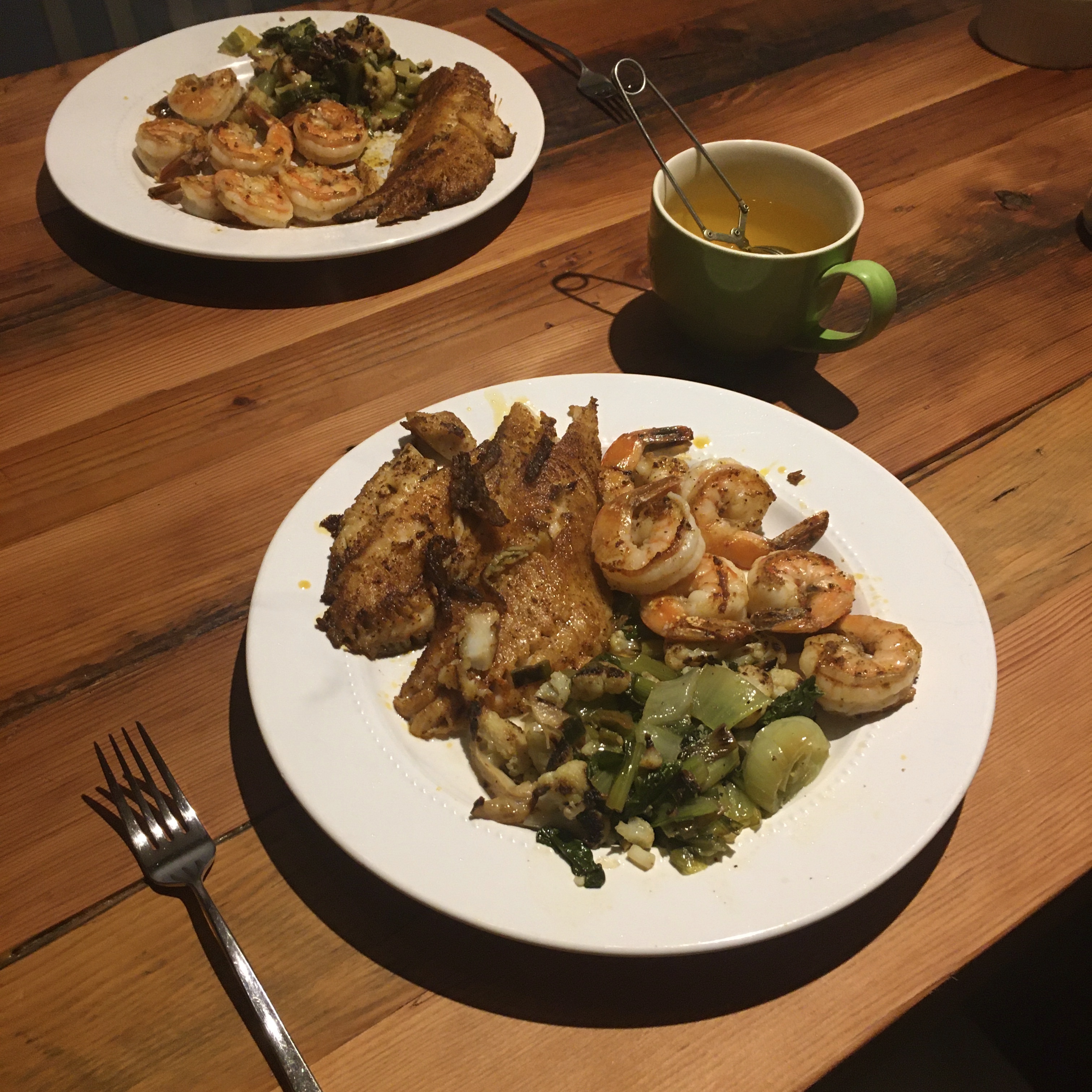Overcome Your Gut + Digestive Issues With Ancestral Nutrition
3 Common Causes For Gut Issues And Their Cures

Our gut breaks down food; absorbs nutrients; keeps pathogens out; helps detox our body of waste (like dead tissues and toxins); and plays an important role in brain, hormonal, and immune health. Needless to say, it’s extremely important!
When our gut is functioning optimally we hardly even notice it. However when issues arise, we quickly notice the uncomfortable symptoms or in severe cases a whole cascade of many complex symptoms.
Symptoms like:
- Intestinal Cramps or Pain
- Bloating
- Acid Reflux
- Diarrhea
- Constipation
- Nausea
- Smelly Farts
- Fatigue
- Headaches
- Nutrient Deficiencies
- Unwanted Weight Loss or Gain
- Stress and Anxiety
- Yeast and Parasite Infections
- Ulcers
- Acne
- Food Sensitivities
- Low Libido
- Poor Fertility
- Brain Fog
- Weak Immune System (Get Sick Easily)
- Depression
- Chronic Conditions Like Autoimmune Diseases, IBS, IBD, SIBO, etc.
- And More!
Some of the main problems that cause these symptoms are:
- Gut Dysbiosis
- Leaky Gut
- Lack of Sufficient Stomach Acid
To restore balance to your gut, it’s important to identify if any of these are causing your gut issues and to then address them accordingly. I will dig into the specifics of these 3 causes and how to address them below.
1) Gut Dysbiosis:

Gut dysbiosis is when the balance between good bacteria and pathogenic bacteria in your gut is disturbed and you get an overgrowth of pathogenic bacteria and often yeasts and fungi.
This overgrowth is made possible by inadequate levels of good bacteria which can be caused by many things, including:
- Stress
- Antibiotic Use
- Tobacco Use + Alcohol Consumption (More info on how alcohol negatively affects your gut and overall health here)
- Consuming Processed Foods + Food Additives
- Sleep Problems + Circadian Disruptions (You can find tips to optimize your sleep in this article)
- Environmental Toxins
- Nutrient Deficiencies
- Lack of Physical Activity
- Not Enough Time Outside
- Too Much Sanitation
Dysbiosis is one of the underlining causes for many gut disorders and therefore addressing this is a very important part of treatment for many people. First you want to focus on removing pathogenic bacteria, fungi, and parasites. Taking herbs like golden seal, oregano, berberine, grapefruit seed extract, and uva ursi for 3 weeks is a great way to do this.
After this there will be a gap in the bacteria population. It’s very important that you get the next steps right to ensure that gap is filled with good bacteria and not pathogenic ones. For this you want to remove and address any triggers for dysbiosis (like those listed above), eat a clean nutrient rich diet (that means lots of nose to tail animal foods), and you want to get plenty of prebiotics (foods that feed good bacteria) and probiotics (foods that contain good bacteria).
For prebiotics look to garlic, dandelion greens, asparagus, leeks, cacao, bananas, oats, barley, legumes, apple, and artichoke. Make sure to soak the oats, barley, and legumes in water with a dash of apple cider vinegar overnight before cooking. This will help reduce the anti-nutrients content.
For probiotics look to fermented foods like kimchi, sauerkraut, fermented veggies, yogurt, kefir, fermented pickles, and apple cider vinegar that contains the mother.
You may also wish to take a good quality probiotic supplement, however this is optional. If you choose to do so, I’d recommend one that contains Lactobacillus Rhamnosis and Bifidobacteria, needs to be refrigerated, and contains billions of cfus (colony forming units)/live cultures.
2) Leaky Gut:

Leaky gut (aka intestinal permeability) is when gaps form between the epithelial cells that line your intestines allowing unwanted things (like not fully digested food particles, toxins, pathogens, parasites, etc.) to easily slip through the gaps into your blood stream.
Once inside, these things are categorized as foreign by your body and trigger an immune response, which is inflammatory by nature. If the gaps between the cells lining the gut are not tightened and sealed, unwanted things will continue to slip through and cause immune reactions.
Overtime this can lead to chronic inflammation, food sensitivities, autoimmune diseases, decreased immunity, and other health problems.
So what can make your gut leaky?
Plant toxins, stress, and pathogenic bacteria are some of the main causes. Let’s start with plant toxins. Gluten increases a protein called zonulin which loosens the junctions between intestinal cells (and the cells that make up the blood brain barrier).
Lectins (another plant toxin) bind to the cells lining your gut wall and puncture holes in between the cells. On top of this the protein structure of lectins is very similar to several body tissues including the thyroid, myelin sheath (coating of nerves), synovial tissue (connective tissue), and more. If lectins are regularly slipping through a leaky gut into the blood stream, over time your body begins to mistakingly identify your own tissues as lectins and attacks them, thus causing an autoimmune disease.
In general too much improperly prepared plant foods like raw veggies, raw nuts and seeds, seed oils, and non-soaked grains and legumes are damaging to the gut because they’re high in lectins and other anti-nutrients.
Too much fiber, especially insoluble fibers like cellulose, may also harm the gut lining by scraping it and leaving it vulnerable to further damage. Stress is communicated from your brain to gut via the vagus nerve and stress has been shown to increase intestinal permeability as well. Excess pathogenic bacteria, like in the case of gut dysbiosis, also increases zonulin and therefore can cause leaky gut.
So what can you do to heal and seal the gut lining?
• Cut out gluten, grains, and legumes!
• Do an elimination diet (remove any other foods which cause problems for 3 months, then slowly reintroduce them 1 at a time every 2 weeks. Keep a food journal to track your symptoms as you reintroduce foods)
• Detox
• Drink bone broth daily
• Get plenty of nutrients (especially zinc, retinol vitamin A, vitamin D, magnesium, and glutamine)
• Get plenty of sleep
• Take some helpful herbs/supplements such as aloe vera, ginger, chamomile, cramp bark, globe artichoke, and astralgus.
3) Lack of Sufficient Stomach Acid:

Contrary to popular belief, inadequate stomach acid (not too much) can cause acid reflux and poor digestion. After we chew and swallow our food, it travels to the stomach where it’s churned, broken down, and digested. Stomach acid is crucial for the release of digestive enzymes and the proper breakdown of food during this process.
Additionally, the contents of our stomach must be acidic enough to trigger the opening of the pyloric sphincter and allow the partially digested food (known as chyme) to travel into the small intestine.
When stomach acid is too low, the pyloric sphincter has trouble opening and consequently some stomach acid can travel backwards through the lower esophageal sphincter into the esophagus causing acid reflux. Additionally, without adequate stomach acid food, especially protein, often doesn’t get broken down enough before traveling to the small intestine and can therefore cause undesired symptoms like gas and bloating.
To improve stomach acid:
- Drink water with apple cider vinegar before and with meals (Click here for the recipe)
- Avoid drinking plain water and other non-acidic beverages around meal time
- Ditch the antacids!
- Get plenty of zinc, magnesium, and sodium
- Eat mindfully and relaxed
* If you want more info on exactly how to overcome your gut and digestive issues step by step (whether that’s bloating and gas, constipation, diarrhea, digestive cramps and pain, food intolerance/sensitivities, low appetite, skin issues, hormonal issues, or other symptoms) then click here to book a free discovery call with me! Helping people heal their gut and optimize their health is something I’m very passionate about since my own 10 year struggle with chronic constipation and IBS is what got me into the health and nutrition realm in the first place. I was able to fully overcame my gut issues and I’ve helped dozens of other too as well so I know you can too!

